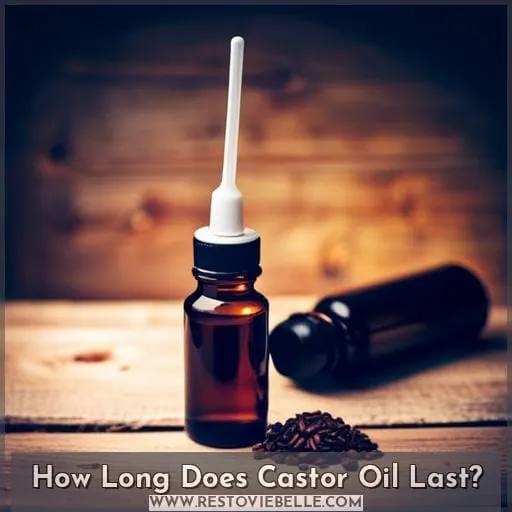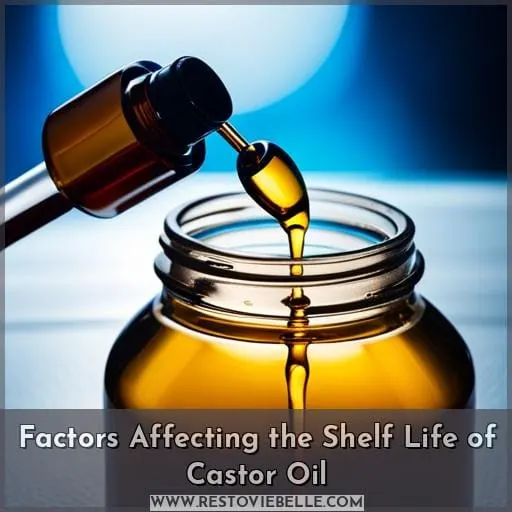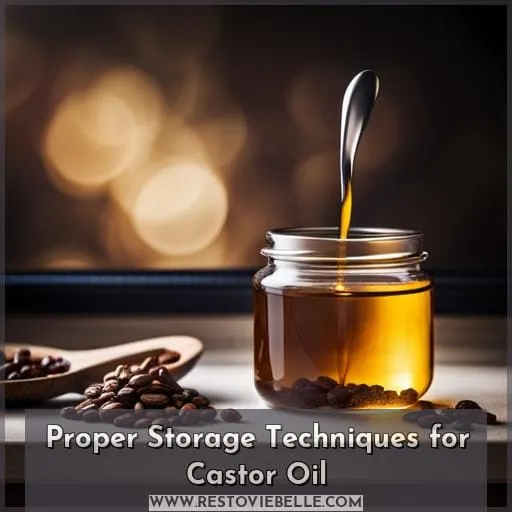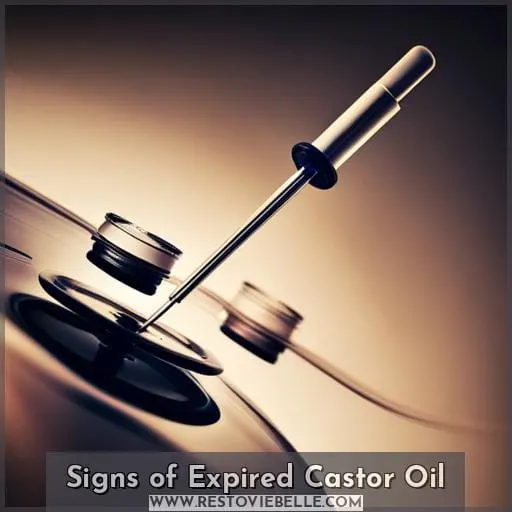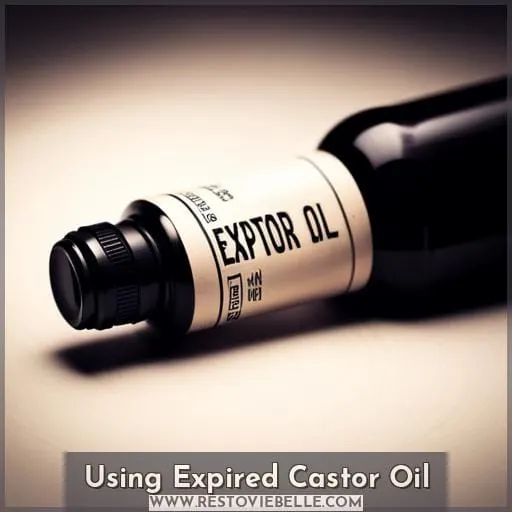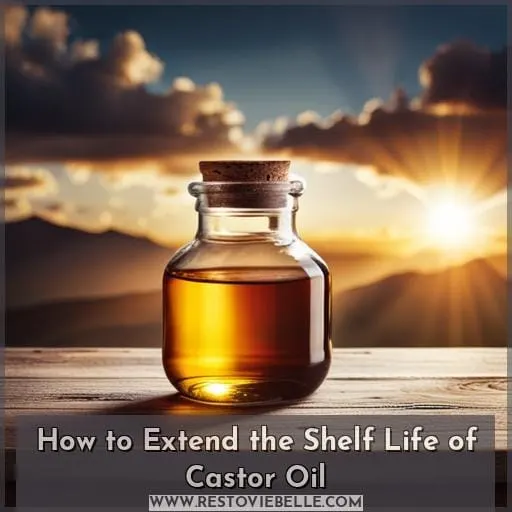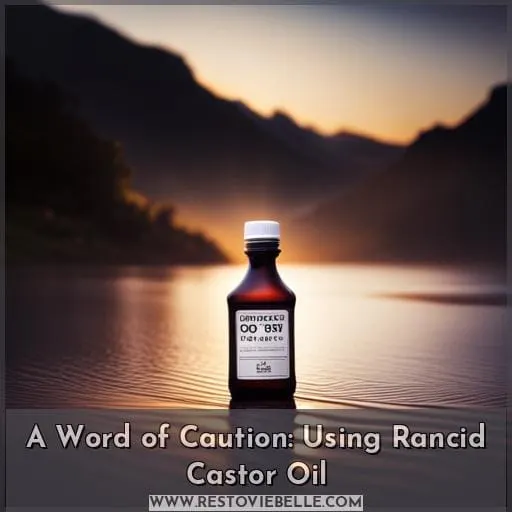This site is supported by our readers. We may earn a commission, at no cost to you, if you purchase through links.

Find out if you can still use expired castor oil and discover recommended products with a longer shelf life.
Table Of Contents
- Key Takeaways
- How Long Does Castor Oil Last?
- Factors Affecting the Shelf Life of Castor Oil
- Proper Storage Techniques for Castor Oil
- Signs of Expired Castor Oil
- Using Expired Castor Oil
- How to Extend the Shelf Life of Castor Oil
- Recommended Castor Oil Products With Longer Shelf Life
- A Word of Caution: Using Rancid Castor Oil
- Frequently Asked Questions (FAQs)
- Conclusion
Key Takeaways
- Castor oil has a shelf life of 1-2 years when stored properly.
- Factors such as storage guidelines, temperature impact, and light exposure can affect the shelf life of castor oil.
- Signs of expired castor oil include changes in odor, texture, and color.
- Expired castor oil may not be as effective or safe and can cause irritation or adverse reactions.
How Long Does Castor Oil Last?
Castor oil typically lasts for about one to two years when stored properly.
The shelf life of castor oil can be influenced by various factors, such as exposure to light and high temperatures.
To ensure the longevity of your castor oil, it’s important to follow proper storage guidelines.
Store it in a cool, dark place away from direct sunlight and heat sources.
Temperature fluctuations can impact the quality of the product over time.
Signs that castor oil has expired include changes in appearance or odor, such as cloudiness or a rancid smell.
Using expired castor oil may lead to reduced effectiveness and potential adverse effects on your health.
To extend its shelf life, make sure to tightly seal the container after each use and avoid contaminating it with water or other substances.
Factors Affecting the Shelf Life of Castor Oil
Now let’s discuss the factors that can affect the shelf life of castor oil.
Proper storage is essential for maintaining its longevity, so be sure to store it in a cool and dark place away from direct sunlight.
Temperature fluctuations can also impact its stability, so try to keep it at a consistent temperature.
By following these guidelines, you can ensure that your castor oil stays fresh and effective for as long as possible.
Factors affecting shelf life
When it comes to the shelf life of castor oil, various factors can impact its longevity.
Factors affecting shelf life include:
- Storage guidelines
- Temperature impact
- Light exposure
Proper storage techniques are important for extending the shelf life of castor oil.
It’s recommended to store castor oil in a cool and dark place to minimize degradation due to heat and light exposure.
Following these guidelines can help ensure the safe use of castor oil for an extended period of time.
Storage guidelines for longevity
To ensure the longevity of your castor oil, follow these storage guidelines:
- Store it in a cool and dry place away from moisture and sunlight.
- Seal the bottle tightly to prevent air exposure.
- Avoid transferring it to other containers as this can introduce contaminants.
- Check for signs of expired oil such as changes in color, texture, or smell before using it.
Using expired oil may lead to ineffective results or potential adverse effects on your health.
Impact of temperature and light
Store your castor oil in a cool, dark place to minimize the impact of temperature and light on its shelf life.
Factors such as temperature and exposure to light can affect the longevity of castor oil.
- Keep it away from direct sunlight or heat sources.
- Store it at room temperature (around 68-77°F or 20-25°C).
- Use an opaque bottle or container to protect it from light.
- Avoid storing it in humid areas, as moisture can also degrade the oil’s quality.
By following these guidelines, you can extend the shelf life of your castor oil and maintain its potency for longer periods of time.
Proper Storage Techniques for Castor Oil
To ensure the longevity of your castor oil, proper storage techniques are essential. By following these guidelines, you can extend the shelf life of your castor oil and maintain its effectiveness for longer periods.
One crucial factor in proper storage is temperature impact. Castor oil should be stored at room temperature, preferably between 68-77°F (20-25°C), to prevent degradation.
Another important consideration is light exposure. Keep your castor oil away from direct sunlight or other sources of UV radiation as they can accelerate oxidation and decrease the shelf life.
Here are some recommended storage techniques for maintaining optimal conditions:
| Storage Technique | Description |
|---|---|
| Store in a cool, dark place | Find a cupboard or drawer away from heat and light sources |
| Use opaque containers | Opt for dark-colored glass bottles that block out light |
| Securely seal container after use | Prevent air exposure by tightly sealing the cap |
By following these proper storage techniques, you can maximize the longevity of your castor oil and ensure its efficacy when used for various purposes such as haircare or constipation relief.
Signs of Expired Castor Oil
If your castor oil has expired, there are clear signs to look out for.
The first sign is odor changes. Expired castor oil may develop a rancid or foul smell, indicating that it’s no longer suitable for use.
Another sign of expiration is texture alteration. You might notice that the consistency of the oil becomes thicker or clumpy over time, making it difficult to apply effectively on your scalp or hair.
Color shifts can also occur in expired castor oil, with the color changing from its original pale yellowish hue to a darker shade.
It’s important to note that as castor oil expires, its efficacy declines as well. Using expired castor oil may not provide you with the desired results for promoting hair growth and maintaining scalp health due to potential degradation of key components like ricinoleic acid.
In addition to these indicators of expiration, safety concerns arise when using outdated products on your body since they may be contaminated by bacteria or other harmful microorganisms.
To ensure effectiveness and prevent any adverse effects on your health condition,
it is recommended always checking the expiry date before using any product containing
castroil
Using Expired Castor Oil
You can still use expired castor oil, but it may not be as effective or safe.
When castor oil expires, its potency and quality diminish over time.
Using expired castor oil for hair care or other purposes may not yield the desired results and could potentially cause irritation or adverse reactions on your skin or scalp.
It’s important to consider shelf life concerns when using any product past its expiration date.
To ensure safety, proper disposal of expired castor oil is recommended by contacting local waste management facilities for guidance on how to dispose of it responsibly.
If you’re concerned about using expired castor oil, there are alternative options available such as fresh batches of high-quality cold-pressed oils like Jamaican black castor oil that have a longer shelf life and retain their beneficial properties.
How to Extend the Shelf Life of Castor Oil
Extend the shelf life of your castor oil by following these simple tips and techniques:
- Store castor oil in a cool, dark place: Keep your castor oil away from direct sunlight and heat sources to prevent degradation.
- Use airtight containers: Transfer the cold-pressed castor oil into opaque glass bottles or containers with tight-fitting lids to protect it from air exposure.
- Avoid contamination: Make sure not to introduce any water or moisture into the bottle, as it can promote bacterial growth and spoilage.
By storing your castor oil properly, you can extend its freshness and maintain its quality for longer periods. This will ensure that you get the maximum benefits when using it for various purposes such as hair care, skincare, or constipation relief.
Remember to check for signs of expiration before use and discard any expired products safely.
Recommended Castor Oil Products With Longer Shelf Life
To ensure the longevity of your castor oil, consider opting for brands that offer extended shelf life. These products are specifically formulated to have a longer lifespan, allowing you to maximize its usage and benefits.
Here are some recommended castor oil products with longer shelf life:
| Brand | Shelf Life |
|---|---|
| Brand A | 2 years |
| Brand B | 3 years |
| Brand C | 4 years |
| Brand D | 5 years |
By choosing these brands, you can be confident in the quality and effectiveness of your castor oil for a prolonged period. Remember to store it properly following the storage tips mentioned earlier to further prolong its longevity.
Regularly check for signs of expired oil and dispose of any rancid or spoiled product promptly.
Using high-quality castor oils with longer shelf life not only ensures their efficacy but also provides excellent skin moisturization when used topically on dry areas such as elbows, knees, and heels.
A Word of Caution: Using Rancid Castor Oil
When using castor oil, it’s important to exercise caution and avoid using rancid oil.
Here are some tips to help you avoid rancid oil:
- Check the expiration date: Always make sure to check the expiration date before using any castor oil product.
- Use your senses: Take a sniff of the oil before applying it. If there’s a strong, unpleasant odor or if the consistency has changed significantly, it may be spoiled.
- Store properly: To prolong freshness, store your castor oil in a cool, dark place away from direct sunlight.
By following these shelf life tips and being mindful of spoilage indicators like smell and consistency changes, you can ensure that you’re getting the best benefits from fresh castor oil without experiencing any adverse side effects.
Frequently Asked Questions (FAQs)
Can I use castor oil past its expiration date?
Yes, you can use castor oil past its expiration date.
While it may lose some effectiveness over time, it’s generally safe to use as long as there are no changes in color, odor, or consistency.
How long does castor oil typically last before it goes bad?
Castor oil typically lasts for about 1-2 years if stored properly in a cool, dark place. Over time, it may lose its effectiveness and develop an off smell. Check for any changes before using.
What are the signs that castor oil has expired?
To determine if castor oil has expired, look for signs such as:
- A foul odor
- Unusual consistency
Expired castor oil may lose its effectiveness and could potentially cause adverse effects.
When in doubt, it’s best to replace it with fresh oil.
Can I still use castor oil if it has changed in color or consistency?
If the color or consistency of your castor oil has changed, it’s best not to use it. These changes may indicate that the oil has expired and could potentially be ineffective or even harmful.
Are there any techniques to extend the shelf life of castor oil?
To extend the shelf life of castor oil,
- Store it in a cool, dark place
- Away from direct sunlight and heat.
Ensure the cap is tightly sealed after each use to prevent oxidation.
Conclusion
So, how long does castor oil actually last?
The shelf life of castor oil can vary depending on various factors such as storage conditions, temperature, and exposure to light.
By following proper storage techniques and being aware of signs of expiration, you can maximize the longevity of your castor oil.
While using expired castor oil may not be recommended, there are ways to extend its shelf life.
Additionally, there are recommended castor oil products available with a longer shelf life.

